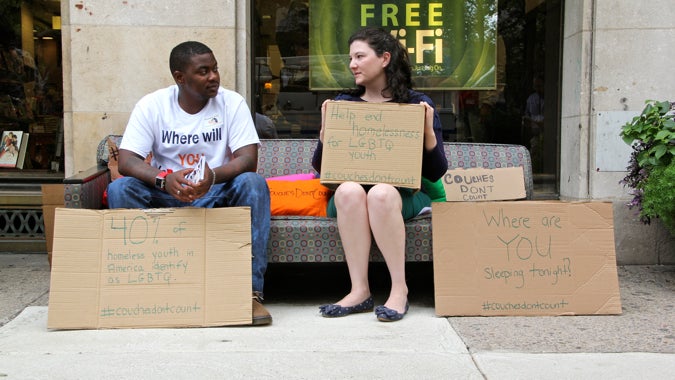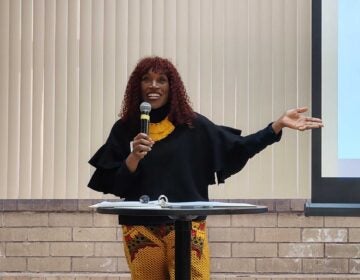Philly group finds new way to couch discussions of plight faced by homeless LGBT youth

Shiykier Davis, who was homeless at 16 because of his sexual preference, shares a couch with Caitlin Pratt of Valley Youth House. The homeless support organization placed a couch in front of the Barnes & Noble at Rittenhouse Square to draw attention to the plight of LGBT youths who often find themselves 'couch surfing.' (Emma Lee/WHYY)
You might see a couch on the streets of Philadelphia these days, but it’s not free for the taking. It’s there to raise awareness of LGBT kids who are homeless.
Valley Youth House, a homeless youth services organization, wants to explain the nuances of homelessness by dropping a couch on various sidewalks around the city and inviting people to sit down and talk with formerly homeless youth. The campaign is called #CouchesDon’tCount.
For many people who see a used couch on the sidewalk, the last thing they want to do is sit on its cloth upholstery.
“It’s a very clean couch. There are no bedbugs on this couch,” said Valerie Johnson, development manager at Valley Youth House. The couch was donated by the Philly Furniture Bank, which supplies furniture and housewares to homeless people transitioning into housing.
About 40 percent of homeless young people are gay, according to national statistics. In Philadelphia, that rate is slightly higher, but those statistics are skewed because many kids do not consider themselves homeless if they can couch-surf.
“If you do have a place to go at night, even if you don’t feel safe there, or you don’t want to be there, or you don’t know the people you are staying with, you have a couch to sleep on,” said Johnson. “So you don’t consider yourself homeless.”
A couch is not a home, and not just because it may not be comfortable. It’s an unstable lifestyle, particularly for teenagers. Depending on whose couch it is, it can be downright dangerous.
“Many are finding friends to couch-hop with, or they are vulnerable to sexual victimization because they utilize survival sex for a place to stay at night,” said Shani Meacham, associate director for housing at Valley Youth House.
For LGBT kids, the burden is exacerbated; even if they admit they are homeless, many are afraid of foster care services. They have learned that foster care can be as bad as, or worse than, the streets.
“If you’re one way, and this foster parent is not comfortable with your decision or with whatever you do, then you’re homeless,” said Shiykier Davis, who was rejected from a foster home when he was 16 for being gay.
Now 27, Davis has his own apartment in Kensington. He works for a temporary labor agency and is a youth leader at Valley Youth House.
Some problems are circumstantial. Other may be systemic. Phantazia Washington, an LGBT trainer at The Attic Youth Center, another youth services organization in Philadelphia, said many foster services do not inquire about sexual orientation.
“They don’t collect information around LGBTQ — or really anybody’s sexual orientation or gender identity — when they enter child welfare systems,” said Washington. “So they are not always placed with folks that are LGBTQ friendly.”
The couch awareness campaign is for the benefit of the general public as much as homeless youth. It will pop up in several places through the weekend.
WHYY is your source for fact-based, in-depth journalism and information. As a nonprofit organization, we rely on financial support from readers like you. Please give today.





